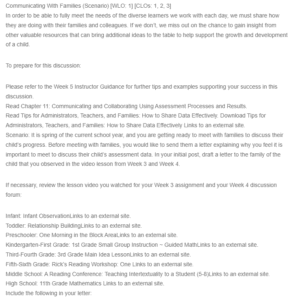Communicating With Families – Assessment Data-Sharing Meeting
Hello parent,
I wish to invite you to our assessment data-sharing meeting. The video I am referring to is Preschooler: One Morning in the Block Area. In this video, a child is playing alone in the block area, and two girls join him, but the child, Travis, is less interested in playing with the others and acts strangely by holding the block over Matilda’s head. Such serious behaviors must be shared with parents through data assessments. Assessments form a vital backbone of the school curriculum as they explicitly demonstrate a learner’s progress and performance. Therefore, sharing assessment data with families is vital because assessment is frequently used in schools, and parents always have questions about their kids’ performances. Sharing assessment data with families is also important because it helps engage communities and families for school improvement (Ishimaru, 2019). It also contributes to the improvement of students’ performance. Besides, McAfee & Leong (2016) affirm that learners whose parents received weekly individualized communication about their kid’s assessments performed much better than those whose assessment data were less communicated to families.
I will use two strategies to share the assessment data during the meeting: data visualizations and parent-child and teacher result discussion. For data visualization, tutors prepare detailed data about each child’s progress in all subjects and other developmental processes like behavioral (Epstein, 2019). For this, I will prepare simple graphs and tables to more interactive media and infographics, allowing smooth communication of assessment results more intuitively and compellingly than traditional means. By making such data, parents and stakeholders can glean vital information and increase the chances of discussing the results. Regarding the second strategy, parent-child and teacher result discussion, I will invite a parent and their child and then discuss their results in the child’s presence.
I have collaborated with other professionals about their child’s assessment data in several scenarios. For example, a parent with a special child approached me and wanted concrete assessment data on the child’s development milestones. I did this using observation and other assessment criteria by observing the child at home and school (Hargreaves, 2019). Eventually, the parent found the right information and evidence to transfer her child to a special school for more help. I have also collaborated with my fellow teachers in discussing the assessment data of one of our most performing students who drastically started failing in almost all assessments. Therefore, I welcome all parents to our assessment data-sharing meeting to learn about their children’s progress in learning.
Reference
McAfee, O. D., & Leong, D. J. (2016). Assessing and guiding young children’s development and learning. Allyn & Bacon, A Viacom Company, 160 Gould St., Needham Heights, MA 02194; Internet: www.abacon.com.
Ishimaru, A. M. (2019). Just schools: Building equitable collaborations with families and communities. Teachers College Press.
Epstein, J. L. (2019). Theory to practice: School and family partnerships lead to school improvement and student success. In school, family and community interaction (pp. 39-52). Routledge.
Hargreaves, A. (2019). Teacher collaboration: 30 years of research on its nature, forms, limitations, and effects. Teachers and Teaching, 25(5), 603-621.
ORDER A PLAGIARISM-FREE PAPER HERE
We’ll write everything from scratch
Question
Communicating With Families (Scenario) [WLO: 1] [CLOs: 1, 2, 3]
In order to be able to fully meet the needs of the diverse learners we work with each day, we must share how they are doing with their families and colleagues. If we don’t, we miss out on the chance to gain insight from other valuable resources that can bring additional ideas to the table to help support the growth and development of a child.

Communicating With Families – Assessment Data-Sharing Meeting
To prepare for this discussion:
Please refer to the Week 5 Instructor Guidance for further tips and examples supporting your success in this discussion.
Read Chapter 11: Communicating and Collaborating Using Assessment Processes and Results.
Read Tips for Administrators, Teachers, and Families: How to Share Data Effectively. Download Tips for Administrators, Teachers, and Families: How to Share Data Effectively Links to an external site.
Scenario: It is spring of the current school year, and you are getting ready to meet with families to discuss their child’s progress. Before meeting with families, you would like to send them a letter explaining why you feel it is important to meet to discuss their child’s assessment data. In your initial post, draft a letter to the family of the child that you observed in the video lesson from Week 3 and Week 4.
If necessary, review the lesson video you watched for your Week 3 assignment and your Week 4 discussion forum:
Infant: Infant ObservationLinks to an external site.
Toddler: Relationship BuildingLinks to an external site.
Preschooler: One Morning in the Block AreaLinks to an external site.
Kindergarten-First Grade: 1st Grade Small Group Instruction ~ Guided MathLinks to an external site.
Third-Fourth Grade: 3rd Grade Main Idea LessonLinks to an external site.
Fifth-Sixth Grade: Rick’s Reading Workshop: One Links to an external site.
Middle School: A Reading Conference: Teaching Intertextuality to a Student (5-8)Links to an external site.
High School: 11th Grade Mathematics Links to an external site.
Include the following in your letter:
State the name of the video you are referring to in the first line of your post.
Explain why you believe it is important to share assessment data with families.
Summarize two ways you will share the assessment results during the meeting.
Describe how you have collaborated with other professionals about their child’s assessment data.

